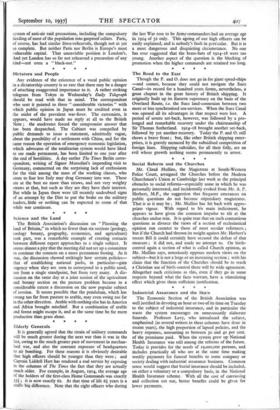* * * * Social Reform and the Churches Mr.
Claud Mullins, the Magistrate at South-Western Police Court, arraigned the Churches before the Modern Churchmen's Union at Cambridge last week as the principal obstacles to social reforms—especially some in which he was personally interested, and incidentally evoked from Mr. A. P. Herbert, M.P., the suggestion that frequent utterances on public questions do not become stipendiary magistrates. That is as it may be ; Mr. Mullins has hit back with appro- priate vigour. With regard to his main indictment, he appears to have given the common impulse to tilt at the churches undue rein. It is quite true that on such contentious questions as divorce the views of a section of ecclesiastical opinion run counter to those of most secular reformers ; but if the Church had thrown its weight against Mr. Herbert's recent Bill it could certainly have secured the defeat of that measure ; it did not, and made no attempt to. On birth- control again a section of what is called Church opinion, as Mr. Mullins says, notoriously opposes modem views on the subject—but it is not a large or an increasing section ; with his claim that the function of the Churches should be to teach a Christian use of birth-control there will be wide agreement. Altogether such criticisms as this, even if they go in some respects beyond what the facts warrant, have a stimulating effect which gives them sufficient justification.










































 Previous page
Previous page